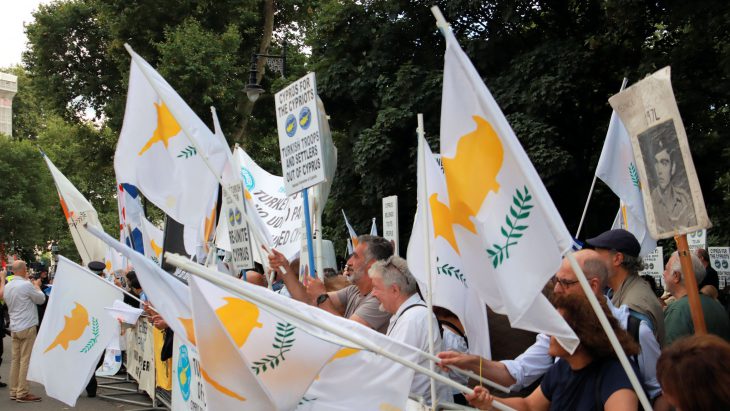
20th July 1974 marks one of the most tragic days in Cypriot history, at 5:30am the war sirens rang around the island once more.
The London Cypriot community will mark the tragic day with a protest at 43 Belgrave Square at 5pm in the evening. The event is organised by a Greek Cypriot and a Turkish Cypriot compatriot, both young Cypriots from London. One of the campaigners told London Greek Radio, his reasons for the local initiative.
“I am a Greek Cypriot [Marios Christofides] and Eren a Turkish Cypriot both members of various organisations and associations regarding Cyprus and the Cyprus problem, however we took it upon ourselves as two individuals as two Cypriots to organise the demo to try and show that irrelevant of ties to organisations we unite as one in the struggle for a free Cyprus, leaving political views, ethnicity, background and all of that behind us and focus on being one as Cypriots to fight for freedom.”
The Republic of Cyprus points to existing UN resolutions that the island reunifies under a federal umbrella with a central government in Nicosia.
In 1974, approximately 40,000 Turkish troops under the command of Lieutenant Nurettin Ersin implemented their invasion plan, code-named ‘Attila’, illegally invading the island in violation of the UN Security Council Charter.
Turkey still illegally occupies 37 per cent of Cyprus’ territory.
Turkish troops invaded Cyprus on July 20, 1974, five days after the legal government of the late Archbishop Makarios III was toppled by a military coup, engineered by the military junta then ruling Greece. Two unproductive conferences in Geneva followed: the first between Britain, Greece and Turkey and the second with the additional attendance of Greek Cypriot and Turkish Cypriot representatives. Three weeks after the ceasefire of July 22, and despite the fact that talks were still being held and just as an agreement seemed about to be reached, the Turkish army mounted a second full-scale offensive. As a result, Turkey increased its hold to include the booming tourist resort of Famagusta in the east and the rich citrus-growing area of Morphou in the west.
All in all, almost 37% of the territory of the Republic of Cyprus came under Turkish military occupation. Nearly one-third of the population, some 200,000 Greek Cypriots, were forcibly uprooted from their homes and properties, thousands were killed during the hostilities, over 1,000 persons were listed as missing while thousands of Greek Cypriots and Maronites remained enclaved.
Numerous UN resolutions have demanded respect to the independence, unity and territorial integrity of Cyprus, the return of the displaced to their homes, and the withdrawal of foreign troops from the island.
The last major round of peace talks collapsed in Crans-Montana, Switzerland, in July 2017.
July 2025, UN informal talks
Attempting to break the impasse, UN Secretary General Antonio Guterres began informal talks between Cypriot President Nicos Christodoulides and Turkish Cypriot leader Ersin Tatar.
Guterres on Thursday called the meetings at the UN in New York “constructive” and pointed to progress on four of the six initiatives that the leaders had agreed to in March.
“I think we are building, step-by-step, confidence and creating conditions to do concrete things to benefit the Cypriot people,” Guterres said in remarks to reporters.
“We are seeing small but significant progress, step by step, towards the major goal which is the resumption of talks and the resolution of the Cyprus problem,” Christodoulides said after the meeting.
The Cyprus problem is complicated and covers a range of critical issues including security, property, refugees, settlers, the economy and the constitution.
July 2025
Pic: National Federation of Cypriots in the UK, 20th July 2024
Article written by London Greek Radio


